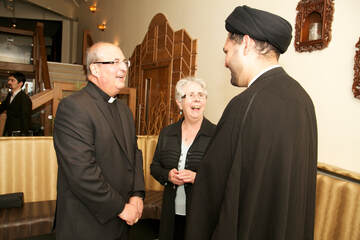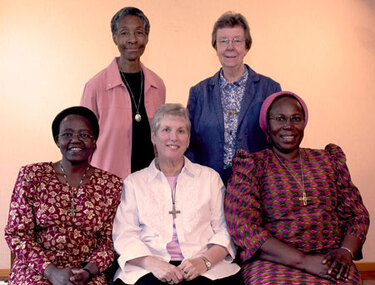
Part of the work of dialogue is to get to know the other which includes recognising and acknowledging our shared history. Like all history, this has good and bad aspects to it, aspects that can be dormant in our community psyche and influence our attitude to one another. This is certainly true for Christian – Muslim relations. Events such as Arab expansionism that defeated the Christian Byzantine Empire, establishing an Arab Empire that dominated most of the known world; the crusades that fought for Christian control of Jerusalem; colonialism that brought Muslim countries under European control can make us suspicious and unsure of one another. It’s not so long ago that there were calls for an apology for the violence of the crusades – something that has died down since the attack on the World Trade Centre.
There is of course much good in the history of relations between our two faiths and indeed between Scotland and the Muslim world, an account of which can be found in Bashir Maan’s book, ‘The Thistle and the Crescent’, which outlines contacts between Scotland and the Arab, Muslim world through pilgrimage and trade. The society that pilgrims and traders encountered was a materially rich and culturally sophisticated one. It was the Arabs that translated many of the Greek works of Plato, Socrates and Aristotle into Arabic thus keeping them alive for such influential theologians as Thomas Aquinas whose theology was a dialogue between the philosophy of Aristotle and the truth of Christianity which he knew from the Latin translations of the Arabic texts. Duns Scotus too studied the works of Muslim philosophers as did many scholars and academics in medieval Britain. The great Muslim centres of learning, Cordoba, Toledo, Cairo, Baghdad were the forerunner of universities and gave much to the world. They established libraries, developed mathematics and astronomy, invented the telescope, compass and the pendulum. They brought the art of Chinese papermaking to the west in the 800s and set up pulp and paper mills for papermaking and money making.
It was through contact with the Muslim world that coffee, the ‘Mahometan Berry’ was brought to Britain by diplomats, travellers and traders in the 17th cy. It was advertised as a beneficial for health. “Its proponents argued that coffee made the drinker, more active, more hard working, more productive” and “the drink of the Protestant Work Ethic because it stimulated the mind of the drinker“(Maan P.128). There were also detractors who denounced it for resulting in what they called Turkish and not Protestant sobriety, leading even to conversion to Islam. The introduction of the English translation of the Qur’an, translated by a Scot, Alexander Ross and the wearing of Turkish dress in the coffee houses added to this notion.
Alexander Ross was not the only Scot who was enthralled by Islam. Michael Scot (1175 – 1232) a famous Scottish philosopher, translator, mathematician, and astrologer studied in Muslim Spain at Toledo. He learned Arabic and was one of those scholars who translated Arab treatises into Latin, thus making them available to Europe. Bashir Maan tells how he accompanied Emperor Frederick, for whom he worked, on his crusade of 1228 and, because he could speak Arabic, played an important role in the negotiations for the peaceful recovery of Jerusalem between the Emperor and Sultan Al-Kamal whose offer of peace had been refused. Al-Kamal is the same Sultan whom St Francis Assisi met when he travelled to Damietta in Egypt, hoping for martyrdom but finding instead a fellow man of God. One story goes that Francis and the brother accompanying him stayed for a week, another that they stayed for three weeks but all are agreed that they recognised one another’s holiness and spent their time talking of the things of God. This is often taken as an example of interfaith dialogue and St Francis seen as the patron saint of dialogue. It’s good and intriguing to know that we Scots have a connection with that event.
There’s much more to the history of Christian – Muslim relations. Knowing just a little of it reminds me of our interconnectedness and hopefully adds depth to our dialogues and encounters.



 RSS Feed
RSS Feed
